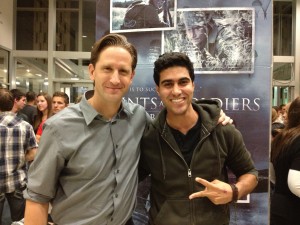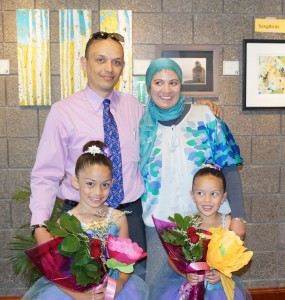
The political unrest and deadly protests that rocked Egypt in January have personal significance for Egyptians among the BYU community.
Mohammad Aboulilah, 25, is a BYU Arabic instructor. He remembers walking in streets and holding flags during the revolution two years ago. His home in Sinai is about a six-hour drive from Cairo, the capitol, but the police could not maintain order in his city either.
“My neighbors and I had to do patrols to protect our neighborhood,” Mohammad said. “Yeah, it was a hard time. Alhamdulillah (Praise be to God) … nobody attacked us or our houses. So it went okay.”
Aboulilah came to BYU through the Fulbright Foreign Language Teaching Program. He is cheerful and personable. He still prefers Arabic cuisine, “But (Americans) make the best hamburgers ever,” he said.

Although BYU does not currently have any Egyptian undergraduate students, Shereen Salah is an adjunct faculty member in the Arabic program. Her husband Ahmad Salah is also Egyptian, got his PhD here in Civil Engineering, and is the Imam (Muslim spiritual leader) at BYU.
“Being Egyptian here is nothing special,” Ahmad Salah said. “It’s just being away from home in situations like this is what feels the worst.”
Jan. 25 marked the two-year anniversary of the uprising in Tahrir Square that sparked a revolution. Thousands of protestors came to the streets again, but this time in opposition to President Mohammad Morsi and his party, the Muslim Brotherhood.
Morsi’s term has been complicated. He received international praise early on for helping to broker a ceasefire between Israel and Hamas but then drew heavy criticism from some Egyptians, who called him dictatorial, when he decreed that his decisions could no longer be challenged by the judiciary branch (he later reversed the decree).
The Muslim Brotherhood is a very conservative Islamic party. Ahmad Salah said many people expect him to support the Brotherhood because he is a Muslim, but he is strongly against them.
“In today’s world, I just don’t like to mix religion and politics, period … these two are separate, distinct areas of expertise,” Ahmad said. “You need to be qualified and experienced in both to mix them well, and that never happens … And the result is chaos.”
Aboulilah feels differently about President Morsi.
“It will take some time to fix the system … So I’d say give him some time,” Aboulilah said. “Even in the U.S., Obama couldn’t fix the economy in four years.”
He said that the protests are a bad idea.
“What the people are doing right now is just silly,” Aboulilah said, referring to violent protests that have occurred outside the gates of the presidential palace. “I don’t support it … and the police have to protect the palace … and people die and get injured … it’s just so dramatic. It’s not right.”

Makram Ibrahim, 29, is a student in BYU’s English as a Second Language program. He last visited Egypt in 2008. Since then, he’s lived in Italy and Switzerland, where he joined the LDS Church. He does not support Morsi or the Muslim Brotherhood, but he says it’s not because he’s a Christian.
Ibrahim says he believes that Egypt’s leaders care more about power than they do about the people or the economy. He also does not believe they are qualified to lead and does not favor the Obama administration’s support of Morsi.
“It’s because they want access to Iran or Afghanistan … America wants to be in control. That’s what I feel, my analysis.”
Makram said that he never feels lonely in Provo because it’s peaceful and friends surround him, but he feels a strong tie to Egypt still.
“I wish to be there,” he said. “I wish to fight for my land, my country. I wish to fight to get the freedom for my new generation, or it might be my children. My future.”
Aboulilah focuses more on patience and valuing the richness of the nation. He acknowledged that students might want to give it a couple years to settle down, but he encourages people to visit.
“In Egypt we have everything. We have the people, the weather, the culture, the geography, and the food,” Aboulilah said.
Ahmad Salah expressed discouragement that post-revolutionary Egypt has struggled so badly, but he has not given up hope for a better future for Egypt.
“The one benefit of the revolution, in my opinion,” Ahmad Salah said, “is not that we kicked out an old regime, but that we learned how to kick out people.”




